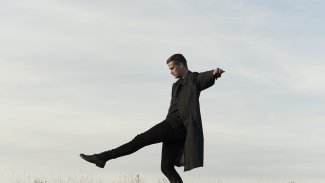
A conversation with… Sauli Zinovjev
23/3/2023
A conversation with… is a Birdsong blog series
What’s your earliest musical memory?
Although there are no other musicians in our family, music was heavily present in my childhood. My grandparents, who I mainly grew up with, are huge lovers of classical music and I grew up playing Lego while Mahler’s symphonies were blasting in the background. I also remember finding a harmonica which I loved improvising with until the last breath and passing out on the floor. Weirdly I recall I absolutely could not stand any singing scenes in children movies. Maybe there were too many emotions for me back then to process or I was just too impatient to step aside to hold from a thrilling plot.
Do you see yourself as composing in a particular lineage or tradition?
I admire the classical lineage which can be traced back centuries and it is wonderful how logical it looks now in retrospect. Although, I’m very sure it has been a complete mess for each individual composer to work in their own era trying to find their own voice. I feel I’m a cocktail of my own time, being influenced by the everyday things around me which all respectively own their share to the tradition we all come from. To add something in I think it is necessary to rebel against the tradition.
What was your inspiration for your new work Double Concerto?
The first idea for Double Concerto was absolutely to not call the piece a Double Concerto and rather approach the composition in a one solemn movement. Well, little did I know, but eventually the nocturnal and gloomy soundscape remained the main character of the music.
I must admit that there was a lot of frustration happening around the time of the composing process for this piece, which obviously affected the work a lot. There is a new level of expressionism involved in the work which is almost violent at times. Someone after the premiere described it well in my opinion, ”like some black paint crossed over the work”. I personally find this expression almost theatrical. That is the direction I feel tempted to go in future as well, as I’ve noticed that the most turbulent art experiences I’ve experienced myself have been through the works which shake me and pop out from their frames and slap my face.
Do you have a favourite instrument to write for?
I’ve always struggled so much with all the instruments independently, so my way of survival has been combining them all to an orchestra of some sort. I’m tempted by an idea of creating “macro instruments” by combining multiple instruments together and weaving them into textures.
You’ve said that up until the age of sixteen you played guitar in a rock band. Does rock music influence your classical composition?
Absolutely — actually, the entire urge to compose followed me from jumping over the ditch from band world where it was natural and even assumed one to make their own music. With the energy and ambition we had, we were not wise enough to see any difference between us and Pink Floyd for example. This reckless attitude is something that followed me and there I saw me among Schubert, Mahler and Prokofiev, as stupid as it may sound, but this is really the power that gave me courage and eagerness to dive into water to learn how to swim. I think my first classical composition was modestly a piano concerto, obviously quite different from the recent one I did to Víkingur Ólafsson, but one has to start somewhere.
One of the paradoxes of making art I guess is to be overly excited about something that does not exist yet — that said, I try to sketch my ideas with as low boundaries as possible to have some concrete thing to grab on. In this place, I’ve found inspiration from cross genres comes in handy. One concrete way I’ve used is to pick a piece I’m impacted by and continue to arrange a part of it for the ensemble I’m currently working on. Usually, this way of working gives me some insights and ideas which inspires me to keep working on and moving past the sketches so if these segments happen to end up in the final composition in some form, they are rarely recognizable.
What do you like to do when you’re not composing?
The time that I’m able to use for actual composing in terms of writing notes is quite limited, so I’m left with a substantial amount of time to explore things, supporting me to stay inspired and giving new insights on the world and to be honest — a lot of time to agonise, a lot and every day, but that is a part of being a composer too, right? I get excited about tons of things but art in its all forms is something that has stayed close to my heart.


